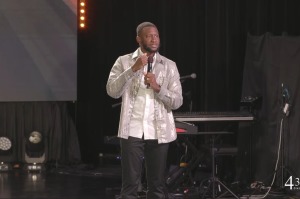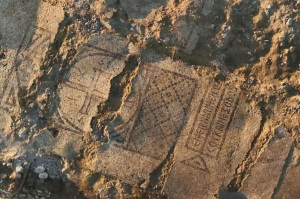Joshua - Film Review
Joshua, the breezy adaptation of Joseph Girzone's beloved novel, tells the story of what might happen if Jesus were to visit the world today to remind everyone of the reason He died for us. It's not a re-telling of the story of Christ's life on earth in modern terms. It's a completely new story with a "what if?" premise.
When Joshua (which, in case you didn't know, is Jesus' proper name as translated from the Hebrew Yeshua) comes to the small, nondescript town of Auburn, it doesn't cause the instant stirring you'd expect. Rather, little by little, people are drawn to this friendly man. He takes up various projects around town for no other reason than that they need to be done, such as rebuilding an old Baptist church that was destroyed by a storm, helping a Catholic priest find his place, and crafting a statue of St. Peter. As in the Bible, Joshua is a carpenter, a man who gets his hands dirty in rough, real work.
What's compelling about Girzone's interpretation of Jesus, played with quiet resonance by Tony Goldwyn, is that he's never a show-off or a know-it-all -- he's just a compassionate man who wants to help. There are miracles, and there are moments where Joshua hands out godly wisdom, but the focus is one what he does, not what he says. He involves himself in the townspeople's lives in a humble, non-threatening way.
The film plays on themes of fearing God vs. loving God, and love is definitely the recommended path. There's not one glimpse of the vengeful God of wrath that we sometimes envision. As portrayed here, Jesus is a genuine person with his own unique personality, and he shows love and compassion to everyone, whether they deserve it or not.
What's good: the portrayal of Jesus as something other than a distant figurehead. The promotion of the church's various denominations as all connected, part of the same family. And consider this: God could have prevented that Baptist church from collapsing to begin with, as He has the power to prevent any tragedy, but he didn't. But because he didn't, the lives of these townspeople are changed in radical ways, as they join together to rebuild it. The message is that life isn't about the inevitable ups and downs that earthly reality brings, it's about the journey, about what we take away from it and how we choose to approach it.
What's not good: the film's editing is extremely choppy, unfolding the story in a disjointed way that has no flow, almost episodic in nature. The film attempts levity repeatedly, and not every try comes off, but the light-hearted nature is appreciated in a genre where so many films are filled with heaviness and woe. The viewer watches the entire film wondering why all this is happening, what the point of Jesus' returning now, in this way, is. An adequate and powerful explanation is given in the film's climactic scene, but blink and you'll miss it.
Third Day makes a appearance in the film at a church concert, performing "Come Together" and "My Hope Is You," and to their credit, they play it completely straight with the same passion and fire as their live shows. Joshua also marks the first ever full-length motion picture score by Michael W. Smith, something that Smitty fans know he has long aspired to. He brings to the table a score that's lovely and appropriate without being obtrusive.
Joshua is not a perfect film by any stretch, and there are several scenes that will have you checking your watch and wondering what the point of all this is. But it comes together in the end surprisingly well and stays with you long after it ends. If nothing else, it's worth viewing for its refreshing portrayal of Jesus as a real person.
By Robin Parrish





























